The new MPH: Preparing the 21st-century public health workforce
May 15, 2018
Today, public health education is changing more than it has in decades.
Gillings School leaders were beginning to plan for changes in the School’s academic programs when the Council on Education in Public Health (CEPH), the School’s largest accreditor, issued new criteria for the accreditation of schools and programs of public health in November 2016.
The changes are profound and affect all degrees. Leaders at the Gillings School and others are making dramatic changes in how educational programs are organized and training occurs. For example, we are revising the Master of Public Health (MPH) degree to be more practice-based and focused on applying foundational knowledge and skills to current and emerging public health issues. Recognizing that all students need certain foundational skills, the Gillings School has transitioned from separate, stand-alone core courses to an integrated one – and to concentration areas that either may be within traditional departments or across departments.
 Knowing that new criteria were imminent, and that it was time to change, leaders at the Gillings School were committed to change with excellence, intelligence, integrity and intention. The multi-year planning process has yielded a new core course sequence and set of concentrations consistent with national guidelines and the wisdom of the Gillings School’s key stakeholders. Some concentrations align with departments, such as “Health Policy,” and others, such as “Global Health” and “Health Equity, Social Justice and Human Rights,” cross departmental boundaries. The new 12-credit integrated core course sequence will be rolled out in fall 2018. Having focused first on the MPH program, School leaders next will begin to address baccalaureate and doctoral programs.
Knowing that new criteria were imminent, and that it was time to change, leaders at the Gillings School were committed to change with excellence, intelligence, integrity and intention. The multi-year planning process has yielded a new core course sequence and set of concentrations consistent with national guidelines and the wisdom of the Gillings School’s key stakeholders. Some concentrations align with departments, such as “Health Policy,” and others, such as “Global Health” and “Health Equity, Social Justice and Human Rights,” cross departmental boundaries. The new 12-credit integrated core course sequence will be rolled out in fall 2018. Having focused first on the MPH program, School leaders next will begin to address baccalaureate and doctoral programs.
“Our students are passionate about making change in the world, and the new core will engage students immediately to understand and solve big, timely, real-world problems,” says Elizabeth French, MA, assistant dean for strategic initiatives at the Gillings School. “When students finish the integrated core courses, they will have a shared vocabulary, a sophisticated set of tools and leadership skills for their future careers.”
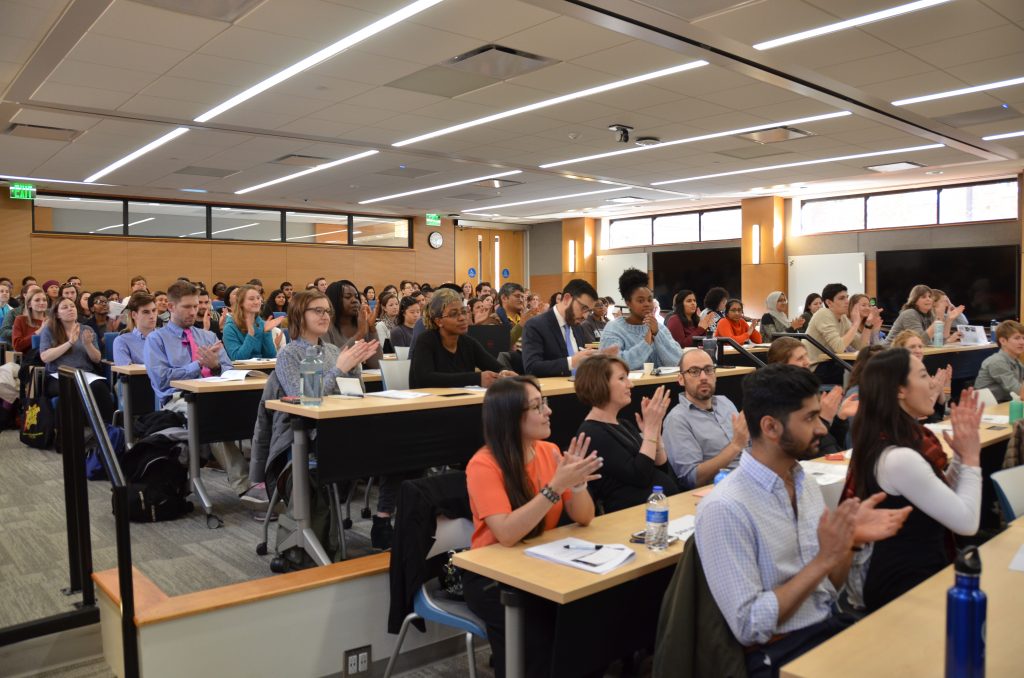
The fully renovated Joan H. Gillings Auditorium provides students with a comfortable learning environment and state- of-the-art technology. (Photo by Jennie Saia)
Varsha Subramanyam, a second-year MPH student in health behavior who worked with the team that developed the new core courses, is enthusiastic about the new core curriculum.
“It’s an interdisciplinary curriculum that brings together students from across the School to get the foundational concepts of public health before they move into their concentration focus,” Subramanyam says.
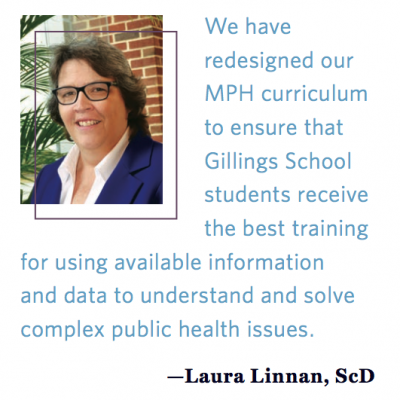 Throughout the integrated core classes, practitioners and alumni will give guest lectures in the classroom, work with student teams, and serve as mentors on assignments. Beginning in fall 2019, students may choose from 11 MPH degree concentration areas, including applied epidemiology; environmental health solutions; global health; health behavior; health equity, social justice and human rights; health policy; leadership in practice; maternal, child and family health; nutrition; population health for clinicians; and public health data science.
Throughout the integrated core classes, practitioners and alumni will give guest lectures in the classroom, work with student teams, and serve as mentors on assignments. Beginning in fall 2019, students may choose from 11 MPH degree concentration areas, including applied epidemiology; environmental health solutions; global health; health behavior; health equity, social justice and human rights; health policy; leadership in practice; maternal, child and family health; nutrition; population health for clinicians; and public health data science.
“We had a fully engaged discussion among our current students, faculty, alumni, staff, employers and practice-based partners to explore training needs for the next generation of public health professionals,” says Laura Linnan, ScD, professor of health behavior and senior associate dean for academic and student affairs at the Gillings School. “We have redesigned our MPH curriculum to ensure that Gillings School students receive the best training for using available information and data to understand and solve complex public health issues.”
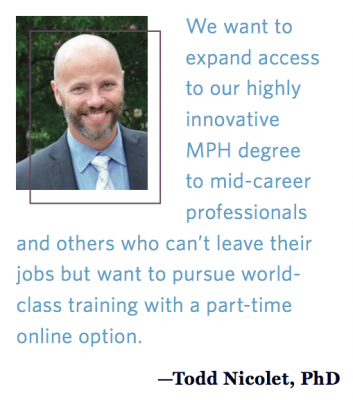 Linnan says School leaders want to ensure that students are fully prepared with the skills, experience and capacity to lead successful data-driven public health programs and policies.
Linnan says School leaders want to ensure that students are fully prepared with the skills, experience and capacity to lead successful data-driven public health programs and policies.
“Gillings School graduates will continue to be great practitioners,” she says, “and that emphasis and commitment to practice connects the School’s past and future.”
In parallel to changes in the residential MPH program, new online MPH programs will be offered.
“We want to expand access to our highly innovative MPH degree to mid-career professionals and others who can’t leave their jobs but want to pursue world-class training with a part-time online option,” says Todd Nicolet, PhD, vice dean at the Gillings School. “Partnering with 2U – a company that specializes in digital education – will allow us to harness the full power of the internet and integrated technologies as we implement our new MPH degree.”
The first cohort of students in the online “MPH@UNC” will begin in fall 2018.
“We are transforming our academic programs to meet 21st-century public health needs,” says Barbara K. Rimer, DrPH, dean of the Gillings School. “We will teach using best practices, and students will have the opportunity for interdisciplinary experiences – taught, guided and mentored by Gillings School faculty members, who are among the best in the world.”
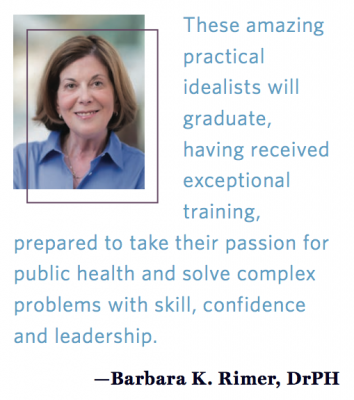 Even while they are students, those at the Gillings School will begin to solve some of public health’s greatest threats and challenges, using 21st-century tools.
Even while they are students, those at the Gillings School will begin to solve some of public health’s greatest threats and challenges, using 21st-century tools.
“These amazing practical idealists will graduate, having received exceptional training, prepared to take their passion for public health and solve complex problems with skill, confidence and leadership,” Rimer says. “This is what people at the Gillings School always have done remarkably well.”
—Michele Lynn
Learn more at sph.unc.edu/mph.
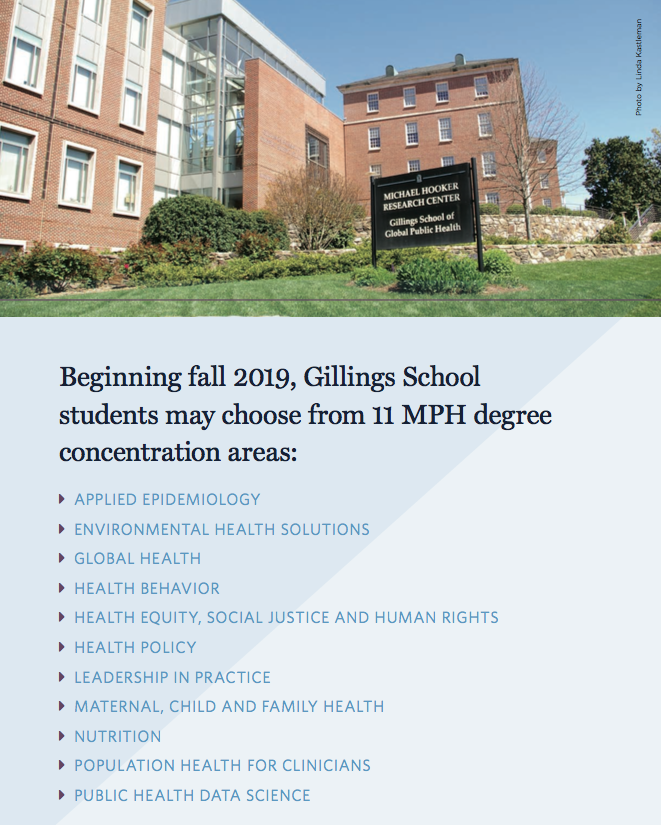
Carolina Public Health is a publication of the University of North Carolina at Chapel Hill Gillings School of Global Public Health. To view previous issues, please visit sph.unc.edu/cph.
